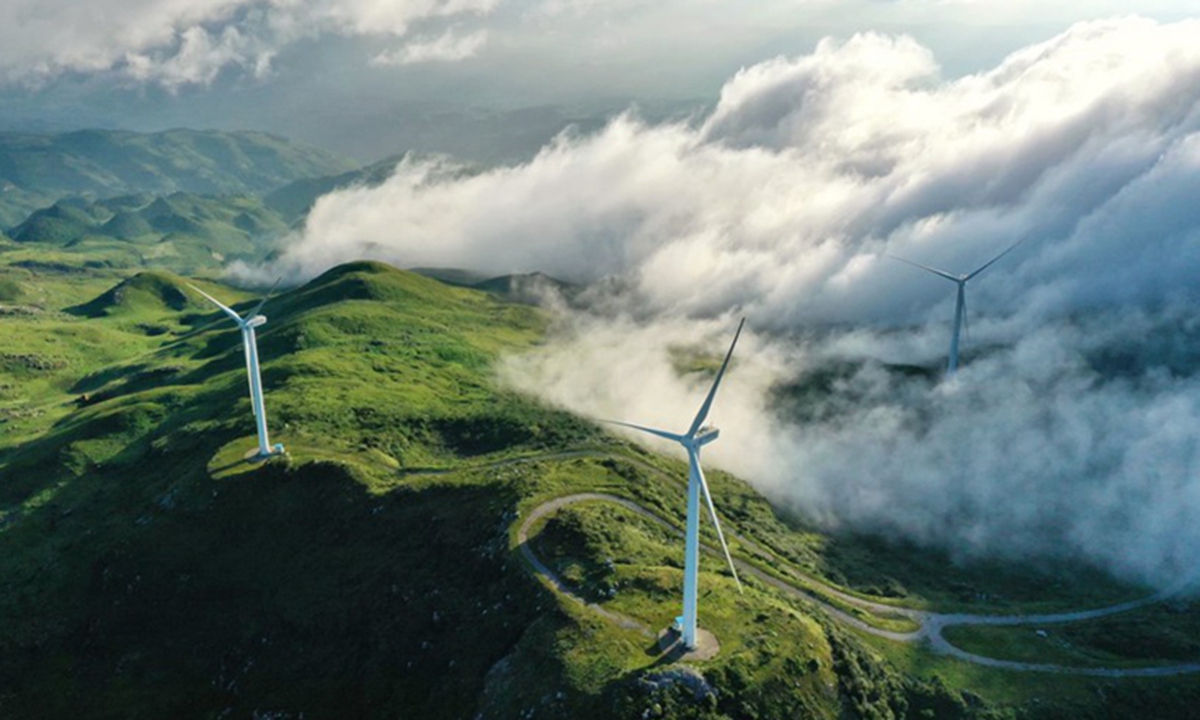Climate action must be fair, avoid suppression of developing countries’ rights: Global Times editorial

Aerial photo taken on August 19, 2020 shows wind turbines in Jiucaiping scenic spot in Southwest China's Guizhou Province. Photo: Xinhua
The G20 summit will be held in Rome this weekend, and is expected to set the tone for the COP26 global climate summit in Glasgow. The world is paying much attention to the attitude of China and the US. Whether the two largest economies can unite and cooperate will determine the future of the entire operation on climate change.
China-US relations are tense, but talks on climate change have been ongoing. US Special Presidential Envoy for Climate John Kerry visited China twice this year. But there is still a gap between the two countries' claims. To a great extent, such a gap reflects the divergences between developed and developing countries.
The current Democratic government of the US attaches great importance to the climate issue. It has made a commitment to reduce US carbon emissions by 50-52 percent in 2030 compared with 2005. It uses this commitment as leverage to pressure China and other developing countries to accept radical emissions reduction targets. According to US wishes, China should turn off all coal-fired power plants soon and turn to clean energy. This is impossible to achieve.
As the largest developing country, China in 2020 has made a clear commitment to achieve carbon peak by 2030 and carbon neutrality by 2060. China is the first major developing economy to announce a timetable for reducing emissions. Since then, China has not only repeatedly reiterated this commitment, but also announced it will no longer build new overseas coal-fired power projects. These measures have been widely praised by the world.
Not only did China say so, but it also promoted its commitments in domestic industrial policies. The green and low-carbon economy has quickly become a policy slogan in China. The dual control system on energy consumption and energy intensity has been distributed to all provinces and regions, becoming a task to implement. The entire country has been mobilized to reduce carbon emissions.
China has faced a lack of electricity in the second half of 2021. One of the underlying reasons is China's promotion of the dual control system. This shows that China is making efforts to control climate change. This is a country that always keeps its solemn promise. We will learn from the experience to achieve the coordination between carbon peaks, carbon neutrality and the realistic tasks of economic and social development.
The promise of the Biden administration is eye-catching. But there are widespread international doubts about how Washington can ensure the fulfillment of this promise, where its leverage is and how it will ensure the sustainability of the policy.
In the US, only the Democratic government supports the UN climate action. The previous Trump administration blatantly withdrew from the Paris Agreement and threw the entire UN climate action aside. The Biden administration is like a truant returning to class. However, once the Republican Party comes to power, it will be highly uncertain whether the US will "skip class" again and whether the Biden administration's commitment will be overturned again. The G20 summit and the COP26 global climate summit are coming soon, but Biden's $1.75 trillion budget plan focusing on climate change and other issues has not been approved. This has further worsened Biden's credibility.
People are worried that the Biden administration has made promises to the world but will eventually come up with a plan that cannot be implemented. The main function of the plan would be to fool other countries to learn from US "generosity" and sacrifice their own interests to shoulder greater responsibility for emissions reduction than they should.
India is one of the developing economies that most strongly opposes the allocation of emissions reduction responsibility led by the US and Europe. India is already the world's fifth largest economy and the third largest emitter after China and the US. But India's attitude is very tough. It refuses to make any specific commitments, including a timetable for reducing emissions. In India, emissions reduction has not become an agenda in economic and social development yet.
The main responsibility for reducing emissions must be shouldered by developed countries. This is because most carbon dioxide in the atmosphere has been emitted by developed countries since industrialization. Developing countries cannot stop development to meet the climate goals advocated by few developed countries. It is morality to give emissions room for developing countries to let them achieve further economic and social development.
China actively participates in promoting climate action while maintaining economic and social development. The US and other developed economies should respect China's responsible attitude toward overall planning. Facing the threat of climate change, they should work with China to build a community of shared future for mankind.
It is inevitable that some forces will try to use such a big issue to seek geopolitical benefits. For example, some extremist forces in the West want to use climate action to solidify the current development pattern of the world, and suppress the room for China's rise. They want to deprive the vast number of developing countries of the chance to rise economically, instead of urging Western countries to transfer ecological technology and provide assistance to developing countries. We must be vigilant to the influence of the narrow-minded forces on climate action.


